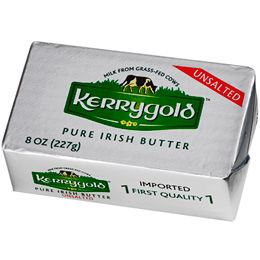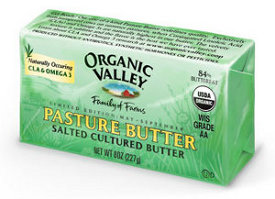As a nutritionist and a natural foods chef, butter is most definitely on my healthy shopping grocery list and enjoyed on the regular in my home. Here’s why and what kind to buy.
As long as you don’t have an allergy or food intolerance, I recommend good, quality butter as part of a healthy diet.
Here’s why
Butter makes all things right in the world, doesn’t it? Heavenly tasting, it’s comforting, satisfying, and helps ground us. No real arguing that. But, the kind of butter matters. Don’t throw all the butter out. Read this first.
A quality butter not only tastes better, but is actually lower in fat and remarkably more nutrient dense, providing a good source of omega 3 fats, B12, beta carotene, vitamin K, D, E, and C; and the best one, conjugated linoleic acid (CLA).
Did you know that CLA is vital for heart health, helps prevent metabolic decline, reduces body fat, and aids in cancer prevention? (More fun reading here) CLA is only present in dairy that comes from cows that have grazed on fresh pasture and have eaten dried grasses, their natural diet – not from cows who have lived a confined life in an indoor feed lot consuming unnatural diets of GMO soy and corn, candy, and other industry food waste by-products. Gross. I don’t make this stuff up.
But… isn’t it a saturated fat and isn’t that bad for us?
Yes and no, respectively. Those fat phobias have been laid to rest many years ago, in research articles like this one. The quality of fat is what matters. Those myths were perpetuated for too long. Unfortunately, they do still linger, so here’s the skinny on this good fat verses its peers on the shelf:
- Margarine, hydrogenated oils, highly processed and GMO/non-organic oils like canola or soybean oil, and trans fats = bad fat, bad for your health, don’t buy
- Butter from grain-fed, conventionally raised cows = not as good, contains higher fat and less nutrients than that of butter from grass-fed cows, don’t buy
- Butter from grass-fed or pastured cows = good fat, better for your health, buy
Do I recommend eating butter at every meal? No. Do I recommend it be in rotation with other healthy oils and fats, like extra virgin olive oil, ghee, flax seed oil, and coconut oil? I do! Variety and balance is always key.
What kind to buy
Butter from grass-fed or pastured cows. Buying from your local farmer is always the best choice, if possible. If not, there are several brands out there of good quality. Two I personally like are Kerrygold’s Pure Irish Butter and Organic Valley Pasture Butter. You’re essentially looking for a label that shows that the butter came from grass-fed or pastured cows. It may or may not say organic, may say non-GMO, antibiotic free. The ingredient label should read: cultured pasteurized cream (milk) or pasteurized cream (milk), microbial cultures.
*Raw, unpasteurized butter is fantastic if you have access to a good, local source.


Unsalted. Salt is in way too much food and we Americans consume way more than we should. You can better control the amount of salt in your diet by buying unsalted butter and adding salt in yourself, if desired.
Get your grass-fed, pastured butter on and don’t look back.
